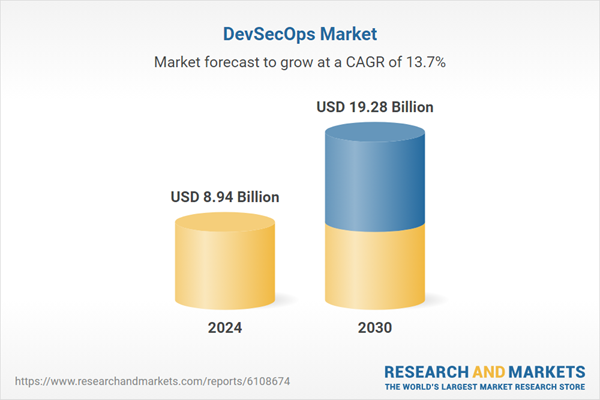Speak directly to the analyst to clarify any post sales queries you may have.
10% Free customizationThis report comes with 10% free customization, enabling you to add data that meets your specific business needs.
Unlike traditional approaches where security is often an afterthought, DevSecOps ensures that security checks are embedded within the development process using automation. This enables early detection of vulnerabilities, improved compliance, and faster release cycles without compromising on safety. The surge in cloud-native applications, microservices, and CI/CD pipelines is fueling demand for DevSecOps, especially as organizations respond to sophisticated cyber threats and increasing regulatory demands. With the rise of remote and distributed teams, secure and agile development practices have become critical, further accelerating the global adoption of DevSecOps solutions.
Key Market Drivers
Increasing Demand for Secure Agile Development
As cybersecurity threats grow more frequent and complex, organizations are increasingly integrating security into every phase of the development lifecycle to support agile delivery models. Traditional security frameworks often fail to keep pace with the speed of modern development, leading to delayed detection of vulnerabilities and increased costs. DevSecOps solves this by enabling automated, continuous security checks aligned with CI/CD pipelines.This integration ensures faster identification and remediation of risks while maintaining agile development speed and flexibility. By embedding security early, organizations reduce post-deployment vulnerabilities and improve overall software reliability. With sectors like fintech, healthcare, and telecom undergoing rapid digital transformation, the push for fast and secure deployments is driving widespread DevSecOps adoption. Early implementation significantly cuts costs and downtime, with some organizations reporting a 65% drop in post-release security flaws, underscoring the approach's value in mitigating risks and enhancing operational efficiency.
Key Market Challenges
Integration Complexity Across Diverse Toolchains
A major hurdle for DevSecOps adoption is the difficulty of integrating security tools into varied and often fragmented technology ecosystems, especially within large enterprises. Unlike new setups, many organizations operate on a combination of legacy systems, proprietary tools, cloud environments, and microservices, complicating seamless DevSecOps implementation.Different teams using varied languages, frameworks, and platforms make it challenging to enforce consistent security standards. Furthermore, the lack of interoperability among many security tools adds to the problem - resulting in gaps in security coverage and increased operational effort. Disconnected tools require complex configurations and steep learning curves, hampering efficient adoption. To address this, organizations must prioritize toolchain orchestration and adopt open-standard, vendor-neutral solutions that scale across diverse environments, allowing for cohesive and manageable security integration.
Key Market Trends
Rise of AI-Driven DevSecOps for Predictive Security
Artificial Intelligence (AI) and Machine Learning (ML) are increasingly being embedded into DevSecOps practices, revolutionizing the way threats are detected and managed. Traditional tools generate numerous false positives, overwhelming developers and analysts with irrelevant alerts. AI-powered platforms mitigate this issue through pattern recognition and behavior analytics, enabling more accurate threat detection and risk-based prioritization. By improving the signal-to-noise ratio, these intelligent systems reduce manual triage and accelerate the response to real vulnerabilities, making security more proactive and efficient.Key Market Players
- Synopsys, Inc.
- Checkmarx Ltd.
- Snyk Ltd.
- Sonatype, Inc.
- GitLab Inc.
- IBM Corporation
- Microsoft Corporation
- Google LLC
Report Scope:
In this report, the Global DevSecOps Market has been segmented into the following categories, in addition to the industry trends which have also been detailed below:DevSecOps Market, By Component:
- Software
- Services
DevSecOps Market, By Deployment:
- On Premises
- Cloud
DevSecOps Market, By Organization Size:
- Large Enterprise
- SMEs
DevSecOps Market, By End Use:
- BFSI
- IT & Telecom
- Government
- Retail & Consumer Goods
- Manufacturing
- Others
DevSecOps Market, By Region:
- North America
- United States
- Canada
- Mexico
- Europe
- Germany
- France
- United Kingdom
- Italy
- Spain
- Asia Pacific
- China
- India
- Japan
- South Korea
- Australia
- Middle East & Africa
- Saudi Arabia
- UAE
- South Africa
- South America
- Brazil
- Colombia
- Argentina
Competitive Landscape
Company Profiles: Detailed analysis of the major companies present in the Global DevSecOps Market.Available Customizations:
With the given market data, the publisher offers customizations according to a company's specific needs. The following customization options are available for the report.Company Information
- Detailed analysis and profiling of additional market players (up to five).
This product will be delivered within 1-3 business days.
Table of Contents
Companies Mentioned
- Synopsys, Inc.
- Checkmarx Ltd.
- Snyk Ltd.
- Sonatype, Inc.
- GitLab Inc.
- IBM Corporation
- Microsoft Corporation
- Google LLC
Table Information
| Report Attribute | Details |
|---|---|
| No. of Pages | 185 |
| Published | July 2025 |
| Forecast Period | 2024 - 2030 |
| Estimated Market Value ( USD | $ 8.94 Billion |
| Forecasted Market Value ( USD | $ 19.28 Billion |
| Compound Annual Growth Rate | 13.6% |
| Regions Covered | Global |
| No. of Companies Mentioned | 8 |









